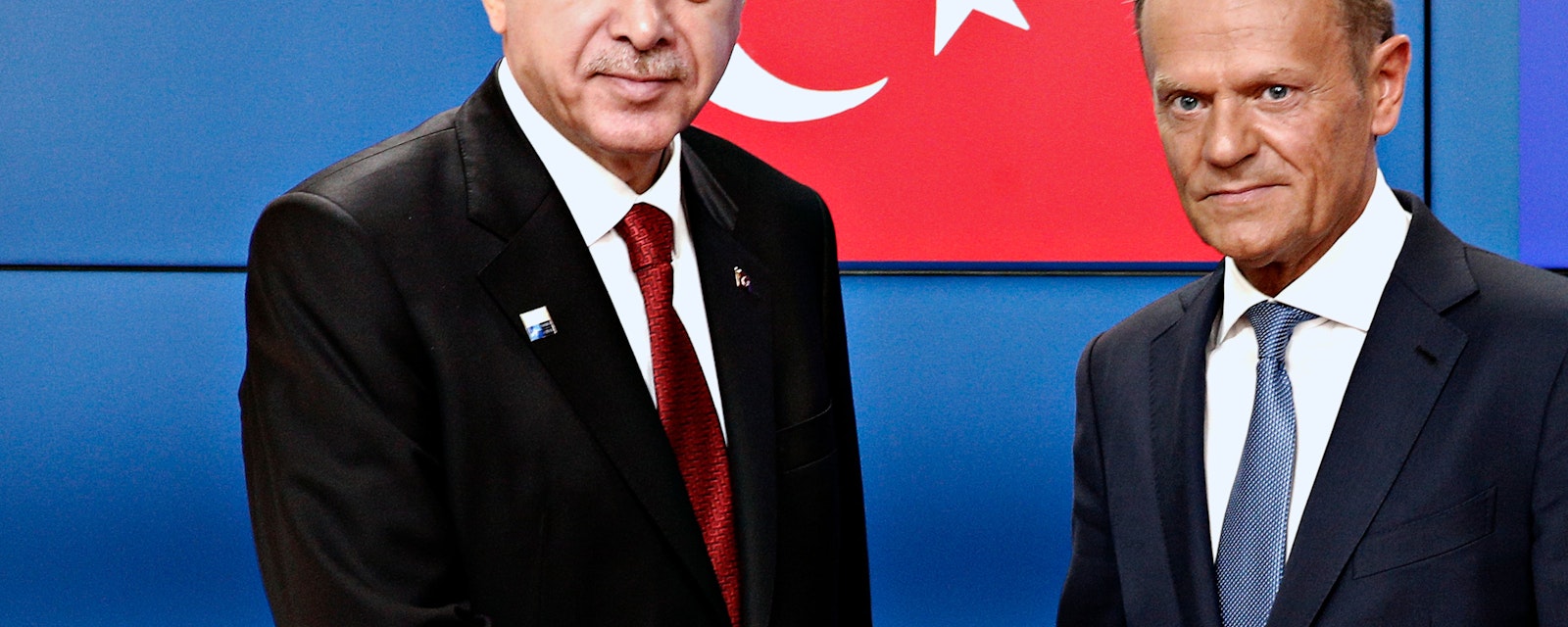President Erdogan’s fresh attempts to compensate for the crisis in his relations with the US by re-engaging with the EU are set to fall far short of his expectations.The EU will neither grant any major political concessions nor provide Turkey with any meaningful financial assistance. Perhaps more worryingly, the focus on revitalizing ties with the EU is a distraction from the increasingly urgent need for the government to address Turkey’s growing economic challenges.
Erdogan’s overture may result in a slight easing in Erdogan’s continuing crackdown on his domestic opponents and critics. Yet, the European Union (EU) is unlikely to respond to Erdogan’s gambit by granting major political concessions, such as lifting visa requirements for Turks visiting the Schengen area or broadening Turkey’s 1996 Customs Union Agreement with the EU – much less provide Ankara with meaningful financial assistance.
Erdogan’s re-engagement with the EU appears to be based on the assumption that Turkey’s relations with Washington and Brussels are largely interchangeable and that a cooling in one can be offset by a warming in the other. In reality, good relations with the US and the EU complement each other. Perhaps more dangerously, the focus on revitalizing ties with the EU is a distraction from the increasingly urgent need for Ankara to address the growing crisis in the economy.
Instead, Erdogan appears to be in denial about the seriousness of the economic situation. He seems to be genuinely convinced that, nearly 16 years after his Justice and Development Party (AKP) first took office, the Turkish economy cannot be anything but sound – and that its current difficulties can only be the result of a politically motivated assault by the US in response to Turkey’s inexorable rise to global pre-eminence under his leadership. This narrative currently dominates the Turkish media, 90% of which is now owned by Erdogan’s business associates, and has gained traction even amongst some Turks who are not AKP supporters. As a result, and unlike during the two most recent economic crises in Turkey in 1994 and 200-01, there is little sign of panic on the streets.
It is likely to be some time before Ankara realizes that its outreach to the EU will fail to produce the desired results. On 29 August, Turkish Foreign Minister Mevlut Cavusoglu chaired a meeting of the Reform Action Group (RAG) at the Turkish Foreign Ministry in Ankara. The RAG, which brings together members of the Turkish Cabinet and other high-ranking officials, was established in 2014 to try to reinvigorate Turkey’s stalled EU accession process. The RAG usually met around three times a year. However, it previously last met in late 2015, since when its meetings had been unofficially suspended.
The decision to revive the RAG will have been taken by Erdogan. It coincided with an increase in contacts between Ankara and both Brussels and the governments of EU member states. Erdogan is due to pay an official visit to Berlin on 28-29 September, which will be the first time he has paid an official visit to Germany since he accused the German authorities of acting like Nazis in March 2017 after they refused to allow him to campaign amongst the Turkish diaspora in the country.
In a statement released after the meeting of the RAG in August, Cavusoglu made it clear that Turkey expects the EU to respond to Ankara’s renewed willingness to engage by lifting visa requirements for Turkish citizens visiting the Schengen area, broadening the Customs Union Agreement to allow greater access to the EU for Turkish agricultural goods, and opening two new chapters in Turkey’s accession process. Privately, AKP officials have also expressed their hopes that Erdogan will secure a promise of substantial financial aid from Germany when he visits Berlin later this month.
No reset ahead
In reality, none of this is likely to happen. There is a mechanism for the EU to provide funding to support the economies of candidate countries. But there is considerable resistance in the EU to helping Erdogan overcome economic difficulties which are regarded as being largely of his own making. More critically, even if the EU were to provide funding, it would fall far short of being sufficient to significantly soften what is likely to be a sharp economic downturn.
Similarly, the EU has already made it clear that Erdogan needs to reverse his domestic authoritarianism and introduce genuinely democratizing reforms before it will even consider concessions to Turkey’s demands on visas or the Customs Union. However, there appears little prospect of Erdogan being prepared to relinquish any of the powers he now exercises.
Nevertheless, even if he fails to secure the results he wants, Erdogan’s decision to try to re-engage with the EU – which has also been reflected in a milder tone towards Europe in the government-controlled media – has at least reduced tensions and improved the prospects for continued cooperation in other areas, such as on the issue of refugees fleeing the Syrian Civil War. It has also come at a time when Turkey’s recent rapprochement with Russia – which Erdogan initially regarded as a counterbalance to Ankara’s ties to the West – is being tested by Turkey’s opposition to the impending military operation by Moscow and Damascus against the rebel-held province of Idlib. Under these circumstances, maintaining at least cordial relations with the EU offers Erdogan the advantage of appearing less internationally isolated in his negotiations with Moscow.





